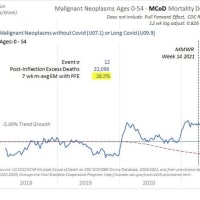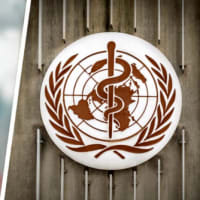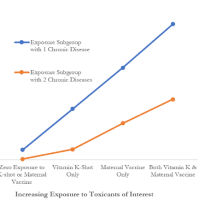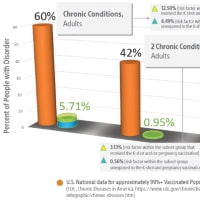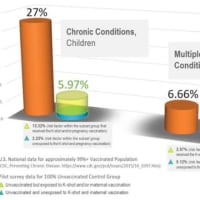CHDアセトアミノフェンと妊娠: 子供の自閉症・注意欠陥/多動性障害のリスクを高める
https://childrenshealthdefense.org/defender/acetaminophen-pregnancy-cola/
01/29/24、2024年1月29日、子供の健康防衛
Acetaminophen and Pregnancy: Here’s What You Should Know
アセトアミノフェンと妊娠:知っておくべきこと
The American College of Obstetricians and Gynecologists (ACOG) warns pregnant women to avoid substances not required for medical reasons to support a healthy pregnancy, yet ACOG and obstetricians and gynecologists from across the U.S. typically identified acetaminophen (Tylenol) as a safe pain reliever for pregnant women despite studies that show otherwise.
米国産科婦人科学会 (ACOG) は、健康な妊娠をサポートするために、医学的理由で必要のない物質を避けるよう妊婦に警告しています。
しかし、米国全土のACOGと産婦人科医は、そうではないことを示す研究にもかかわらず、一般にアセトアミノフェン(タイレノール)を妊婦にとって安全な鎮痛剤であると認識していた。
By Dr. Joseph Mercola
Story at a glance:ストーリーの概要:
・Although most consumers believe that over-the-counter medications are safe and effective, recent data offers more evidence that acetaminophen during pregnancy increases your child’s risk of attention-deficit/hyperactivity disorder (ADHD).
・ほとんどの消費者は市販薬が安全で効果的であると信じていますが、最近のデータは、妊娠中のアセトアミノフェンが子供の注意欠陥/多動性障害(ADHD)のリスクを高めるというより多くの証拠を示しています。
・Using acetaminophen during pregnancy can also increase your child’s risk of autism spectrum disorder (ASD).
・妊娠中にアセトアミノフェンを使用すると、子供の自閉症スペクトラム障害(ASD)のリスクが高まる可能性もあります。
Acetaminophen is found in over 600 medications that are commonly consumed, making it easy to cross the line between a safe dose and a harmful one.
アセトアミノフェンは一般的に消費される 600 以上の医薬品に含まれているため、安全な用量と有害な用量の間の境界線を簡単に越えてしまいます。
・Data show that children who are exposed to acetaminophen after birth to reduce fever and discomfort after vaccination may also have an increased risk of autistic disorder.
・データによると、ワクチン接種後の発熱や不快感を軽減するために出生後にアセトアミノフェンに曝露された子供は、自閉症障害のリスクも増加する可能性があります。
・I believe it’s important to stay away from as many potential toxins as possible to protect the health of your child.
・お子様の健康を守るためには、潜在的な毒素をできるだけ遠ざけることが重要だと思います。
Besides steering clear of alcohol, street drugs and unnecessary prescription drugs, consider avoiding plastic children’s toys, using glass for food and beverage storage, installing a whole-house water filter, using only natural cleaning products and toiletries and avoiding any products with “fragrance.”
アルコール、ストリートドラッグ、不必要な処方薬を避けることに加えて、プラスチック製の子供用おもちゃを避けること、食品や飲料の保管にガラスを使用すること、家全体に浄水器を設置すること、天然洗剤とトイレタリーのみを使用すること、そして「香り」のある製品を避けることを検討してください。」
In general, most consumers believe that over-the-counter medications are both helpful and safe.
一般に、ほとんどの消費者は、市販薬は効果的で安全であると信じています。
The results of one survey showed that as familiarity with the product grew, so did the consumers’ impression of the safety and efficacy of the product.
ある調査の結果によると、製品に対する認知度が高まるにつれて、製品の安全性と有効性に対する消費者の印象も高まったことがわかりました。
The American College of Obstetricians and Gynecologists (ACOG) warns pregnant women to avoid substances that are not required for medical reasons to support a healthy pregnancy.
米国産科婦人科学会(ACOG)は、健康な妊娠をサポートするために、医学的理由から必要のない物質の摂取を避けるよう妊婦に警告しています。
Despite mounting evidence to the contrary, ACOG, obstetricians and gynecologists from across the U.S. have typically identified acetaminophen (Tylenol) as a safe pain reliever for pregnant women.
反対の証拠が増えているにもかかわらず、ACOG、全米の産婦人科医は通常、アセトアミノフェン(タイレノール)が妊婦にとって安全な鎮痛剤であると認識している。
Yet, another study published in January found an increased risk of ADHD in children when mothers used acetaminophen, particularly during the second trimester.
しかし、1月に発表された別の研究では、母親がアセトアミノフェンを使用した場合、特に妊娠第2期に小児のADHDリスクが増加することが判明した。
According to the Centers for Disease Control and Prevention (CDC), roughly 6 million children ages 3-17 were ever diagnosed with ADHD.
アメリカ疾病予防管理センター (CDC) によると、3 歳から 17 歳までの約 600 万人の子供がこれまでに ADHD と診断されました。
This is 9.8% of the population using data extracted from 2016 to 2019.
これは、2016 年から 2019 年に抽出されたデータを使用した人口の 9.8% に相当します。
Additionally, that number rose dramatically between 2003 and 2011, from 4.4% to 6.4% of the general population.
さらに、その数は 2003 年から 2011 年の間に、一般人口の 4.4% から 6.4% へと劇的に増加しました。
ADHD is a neurodevelopmental disorder that affects an individual’s ability to manage their attention, stay organized and control their behavior.
ADHD は神経発達障害であり、注意を管理し、秩序を保ち、行動を制御する個人の能力に影響を与えます。
Data also show that 64% of those with ADHD also have at least one other mental, emotional or behavioral disorder.
また、データによると、ADHD 患者の 64% が少なくとも 1 つの他の精神障害、感情障害、または行動障害を抱えていることも示されています。
While the featured study focused on the neurological implications in children, other data show how acetaminophen affects behavior in adults.
注目の研究は小児における神経学的影響に焦点を当てていますが、他のデータはアセトアミノフェンが成人の行動にどのような影響を与えるかを示しています。
Acetaminophen is found in over 600 medications and is one of the most consumed drugs in the U.S.
アセトアミノフェンは 600 以上の医薬品に含まれており、米国で最も消費されている医薬品の 1 つです。
Researchers tested the hypothesis that 1,000 mg could influence judgment and decisions.
研究者らは、1,000 mg が判断力と意思決定に影響を与える可能性があるという仮説を検証しました。
In three double-blind, placebo-controlled studies in healthy adults, they found acetaminophen increased risk-taking behavior.
健康な成人を対象とした3件の二重盲検プラセボ対照研究で、アセトアミノフェンがリスクを取る行動を増加させることが判明した。
The most recent data demonstrate that exposure during pregnancy may increase a child’s risk of symptoms of ADHD.
最新のデータは、妊娠中の曝露により子供の ADHD 症状のリスクが増加する可能性があることを示しています。
Acetaminophen during pregnancy linked to ADHD in children
妊娠中のアセトアミノフェンは子供のADHDと関連している
In a 2021 consensus paper researchers called for precautionary action in the use of acetaminophen (paracetamol) in light of increasing research data that suggests it may alter fetal development.
2021年のコンセンサス論文で研究者らは、アセトアミノフェン(パラセタモール)が胎児の発育に影響を与える可能性を示唆する研究データが増加していることを踏まえ、アセトアミノフェン(パラセタモール)の使用における予防措置を呼び掛けた。
The review triggered a response from ACOG in which they wrote that there is “no clear evidence that proves a direct relationship between the prudent use of acetaminophen during any trimester and fetal developmental issues.”
このレビューはACOGからの返答を引き起こし、「妊娠期間中のアセトアミノフェンの慎重な使用と胎児の発育問題との直接的な関係を証明する明確な証拠はない」と書かれている。
The most recent paper to support data that acetaminophen during pregnancy could affect neurological development in children was part of the Illinois Kids Development Study that involved tracking prenatal chemical exposure.
妊娠中のアセトアミノフェンが子供の神経学的発達に影響を与える可能性があるというデータを裏付ける最新の論文は、出生前化学物質曝露の追跡を含むイリノイ州子供の発達研究の一部でした。
The data showed that in women who had higher acetaminophen usage during the second trimester, there was an increase in attention-related problems and ADHD-type behavior.
データは、妊娠第 2 期にアセトアミノフェンの使用量が多かった女性では、注意力に関する問題や ADHD タイプの行動が増加したことを示しました。
The researchers used the Child Behavior Checklist (CBCL) to identify behaviors associated with attention deficit and found increased scores at ages 2, 3 and 4 years.
研究者らは、児童行動チェックリスト(CBCL)を使用して注意欠陥に関連する行動を特定し、2、3、4歳でスコアが増加していることを発見しました。
The association appeared to be dose-related, as women with higher exposure during the second trimester had children with higher CBCL scores for attention problems, ADHD and externalizing behavior.
妊娠第 2 期に曝露量が多かった女性の子供は、注意力の問題、ADHD、外在化行動の CBCL スコアが高かったため、この関連性は用量に関連しているようです。
Children whose mothers had a higher cumulative exposure across the entire pregnancy had increased scores for attention problems and ADHD at ages 2 and 3.
母親が妊娠全体を通じてより多くの累積曝露を受けた子供は、2歳と3歳の時点で注意力の問題とADHDのスコアが増加しました。
Megan Woodbury led the research as a graduate student alongside comparative biosciences Professor Emerita Susan Schantz.
ミーガン・ウッドベリーは比較生命科学のスーザン・シャンツ名誉教授とともに大学院生として研究を主導した。
A recent study by these scientists also found that exposure to acetaminophen during pregnancy led to language delays in children.
これらの科学者らによる最近の研究では、妊娠中のアセトアミノフェンへの曝露が子供の言語の遅れにつながることも判明した。
One difference between this study about exposure to acetaminophen during pregnancy and past studies was that researchers in the current study asked pregnant women about acetaminophen use six times during their pregnancy while in other studies they were asked at most once per trimester.
妊娠中のアセトアミノフェンへの曝露に関するこの研究と過去の研究の違いの1つは、現在の研究では研究者が妊娠中の女性にアセトアミノフェンの使用について6回質問しているのに対し、他の研究では妊娠期間ごとに多くても1回質問していることだった。
Caregivers were also asked dozens of standardized questions about their children’s behavior.
養育者には、子どもの行動についての標準化された質問も数多く尋ねられました。
“The kinds of behaviors the caregivers reported included things like the child talking out of turn, not paying attention, not being quiet when they were supposed to be quiet, not sitting down when they were supposed to be sitting down, and being a little aggressive with other children,” Schantz said.
「保護者が報告した行動の種類には、子供が順番を間違えて話す、注意を払わない、静かにすべきときに静かにしない、座るべきときに座らない、他の子供たちに対して少し攻撃的などのものが含まれていました。」とシャンツさんは語った。
Acetaminophen during pregnancy also raises risk of autism
妊娠中のアセトアミノフェンも自閉症のリスクを高める
A study published in 2020 in JAMA Psychiatry strengthened the link between acetaminophen use during pregnancy and ADHD and the risk of ASD.
2020年にJAMA Psychiatry誌に発表された研究では、妊娠中のアセトアミノフェン使用とADHDおよびASDのリスクとの関連性が強化された。
According to the authors:
著者らによると、次のようになっている。
“Prior studies have raised concern about maternal acetaminophen use during pregnancy and increased risk of attention-deficit/hyperactivity disorder (ADHD) and autism spectrum disorder (ASD) in their children; however, most studies have relied on maternal self-report. …
「これまでの研究では、妊娠中の母親のアセトアミノフェン使用と、子供における注意欠陥・多動性障害(ADHD)および自閉症スペクトラム障害(ASD)のリスク増加についての懸念が生じています。 しかし、ほとんどの研究は母親の自己申告に基づいています。
“In this cohort study of 996 mother-infant dyads from the Boston Birth Cohort, cord plasma biomarkers of fetal exposure to acetaminophen were associated with significantly increased risk of childhood attention-deficit/hyperactivity disorder and autism spectrum disorder.”
「ボストン出生コホートの母子二子996人を対象としたこのコホート研究では、アセトアミノフェンへの胎児曝露の臍帯血漿バイオマーカーは、小児期の注意欠陥・多動性障害および自閉症スペクトラム障害のリスクの有意な増加と関連していた。」
Of the 996 participants, only 32.8% were neurotypical, 25.8% had only ADHD, 6.6% had only autism, 4.2% had both ADHD and autism and 30.5% had other types of developmental delays.
996人の参加者のうち、定型発達者はわずか32.8%、ADHDのみが25.8%、自閉症のみが6.6%、ADHDと自閉症の両方が4.2%、その他のタイプの発達遅延が30.5%でした。
The association also appeared to be dose-dependent.
この関連性は用量依存性もあるようです。
The researchers measured cord plasma biomarkers for acetaminophen and found those in the first tertile had a far lower risk of diagnosis of ADHD and ASD than those in the second and third tertiles.
研究者らはアセトアミノフェンの臍帯血漿バイオマーカーを測定し、第1三分位に属するものは第2および第3三分位に属するものよりもADHDおよびASDの診断リスクがはるかに低いことを発見した。
The researchers concluded that the biomarkers in cord blood of fetal exposure to acetaminophen were significantly associated with an increased risk of a diagnosis of childhood ADHD and autism in a dose-response fashion, writing that their findings “support previous studies regarding the association between prenatal and perinatal acetaminophen exposure and childhood neurodevelopmental risk.”
研究者らは、アセトアミノフェンへの胎児曝露を示す臍帯血中のバイオマーカーは、用量反応的に小児期のADHDおよび自閉症の診断リスク増加と有意に関連していると結論付けた。彼らの発見は「出生前および周産期のアセトアミノフェン曝露と小児神経発達リスクとの関連に関するこれまでの研究を裏付ける」と書いている。
As I reported in 2021, more data document disturbing links between acetaminophen use during pregnancy and neurological problems in children, including poor gross motor development, communication issues, increased risk of preeclampsia and a moderately increased risk of undescended testicles and boys.
2021年に私が報告したように、妊娠中のアセトアミノフェンの使用と、粗大運動発達の低下、コミュニケーションの問題、子癇前症のリスク増加、停留精巣と男児の中等度のリスク増加など、小児の神経学的問題との間の憂慮すべき関連性を文書化するデータが増えている。
Data also shows that acetaminophen used after birth may also be linked to an increased risk of autism.
データはまた、出生後に使用されたアセトアミノフェンも自閉症のリスク増加に関連している可能性があることを示しています。
In a small study published in 2008, the researchers concluded that using acetaminophen after vaccination may increase the risk of autism, writing “acetaminophen use after measles-mumps-rubella vaccination was associated with autistic disorder.”
2008年に発表された小規模な研究では、研究者らはワクチン接種後のアセトアミノフェンの使用は自閉症のリスクを高める可能性があると結論付け、「麻疹、おたふく風邪、風疹のワクチン接種後のアセトアミノフェンの使用は自閉症障害と関連している」と書いている。
While parents give babies and infants Tylenol for numerous reasons, one instance in which Tylenol is routinely used is after childhood vaccinations.
親はさまざまな理由で赤ちゃんや幼児にタイレノールを与えますが、タイレノールが定期的に使用される一例は、小児期の予防接種後です。
According to 2009 research published in the journal Lancet, acetaminophen might render vaccinations less effective when administered together.
雑誌『Lancet』に掲載された 2009 年の研究によると、アセトアミノフェンは一緒に投与するとワクチンの効果が低下する可能性があります。
Infants who received acetaminophen right after getting a vaccination experienced lowered immune response and developed significantly fewer antibodies against the disease they were vaccinated against.
ワクチン接種直後にアセトアミノフェンを投与された乳児は、免疫反応の低下を経験し、ワクチン接種した病気に対する抗体の生成が著しく減少しました。
Acetaminophen during pregnancy associated with more risks
妊娠中のアセトアミノフェンはより多くのリスクと関連する
In addition to the risks to babies during pregnancy, acetaminophen use can also increase risks to the mother and other adults.
妊娠中の赤ちゃんへのリスクに加えて、アセトアミノフェンの使用は母親や他の成人へのリスクも高める可能性があります。
Overdose is responsible for nearly half of all acute liver failure cases in the U.S.
米国における急性肝不全症例のほぼ半数は過剰摂取が原因となっています。
While it is considered safe when taken as recommended, the margin between a safe dose and a lethal one is small.
推奨どおりに摂取すれば安全であると考えられていますが、安全な用量と致死量の間の幅は小さいです。
Additionally, you may not always recognize that the over-the-counter drugs you are taking contain acetaminophen.
さらに、服用している市販薬にアセトアミノフェンが含まれていることを必ずしも認識するとは限りません。
Harvard Health recommends caution when dishing out acetaminophen as it is often contained in many other over-the-counter medications.
ハーバード・ヘルスは、アセトアミノフェンは他の多くの市販薬にも含まれていることが多いため、アセトアミノフェンを配布する際には注意することを推奨しています。
Acetaminophen pills are available in 325 milligrams (mg), 500 mg or 650 mg.
アセトアミノフェンの錠剤は、325 ミリグラム (mg)、500 mg、または 650 mg で入手できます。
If you take two 500 mg pills three times a day, you have quickly reached the low end of the recommended dose range.
500 mg 錠剤 2 錠を 1 日 3 回服用すると、すぐに推奨用量範囲の下限に達します。
Acetaminophen is metabolized in the liver, so drinking alcohol can cause the liver to convert acetaminophen into a toxic by-product.
アセトアミノフェンは肝臓で代謝されるため、アルコールを飲むと肝臓でアセトアミノフェンが有毒な副産物に変換される可能性があります。
It is important to recognize that acetaminophen sickens tens of thousands of people every year, and kills several hundred more.
アセトアミノフェンによって毎年数万人が病気になり、さらに数百人が死亡していることを認識することが重要です。
Tips for a more toxin-free pregnancy
より毒素のない妊娠のためのヒント
I believe it is essential to abstain from as many potential toxins as possible to protect the health of your child.
お子様の健康を守るためには、潜在的な毒素をできるだけ避けることが不可欠であると私は信じています。
Our environment is saturated with a wide variety of toxic substances, so you may not be able to defend against each one.
私たちの環境は多種多様な有害物質で飽和しているため、それぞれの有害物質から身を守ることはできないかもしれません。
However, you have a great deal of control over the medications you take and within your immediate household.
ただし、自分が服用している薬や、家族内で服用している薬については、かなりの部分をコントロールすることができます。
For example, it’s important to understand the chemicals you ingest in your food and drink and what’s absorbed through your skin from the household and personal care products you use.
たとえば、食べ物や飲み物から摂取する化学物質や、使用する家庭用製品やパーソナルケア製品から何が皮膚から吸収されるかを理解することが重要です。
Each of these can have an impact on your child’s development and long-term health.
これらはそれぞれ、お子様の発達と長期的な健康に影響を与える可能性があります。
In the past few decades, the prevalence of ADHD and autism have both skyrocketed, which indicates that something is going terribly wrong in the environment.
過去数十年で、ADHD と自閉症の有病率は両方とも急増しています。これは、環境で何かがひどく間違っていることを示しています。
Unfortunately, our children are paying the price for a chemical-laden lifestyle, including the overuse of over-the-counter drugs like acetaminophen.
残念ながら、私たちの子供たちは、アセトアミノフェンなどの市販薬の過剰使用など、化学物質だらけのライフスタイルの代償を支払っているのです。
Consider avoiding any unnecessary drugs or medications, including the COVID-19 jab, which the CDC has officially recommended for pregnant women.
CDCが妊婦に公式に推奨している新型コロナウイルス感染症注射剤を含む、不必要な薬物や投薬を避けることを検討してください。
This can have long-lasting ramifications for your child and your future reproductive health.
これは、お子様と将来の生殖に関する健康に長期にわたる影響を与える可能性があります。
(訳注: 現実の生活では、以下のリストのものを全て実行できる人は、かなり少ないと思います。)
・As much as you’re able, buy and eat organic produce and grass-fed, pastured animal foods to reduce your exposure to agricultural chemicals like glyphosate and others.
・グリホサートなどの農薬への曝露を減らすために、できる限り有機農産物や牧草で育てられた動物性食品を買って食べてください。
Don’t eat processed, prepackaged foods of any kind, which helps you automatically avoid pesticides, artificial food additives, dangerous artificial sweeteners, food coloring, monosodium glutamate, or MSG, and unlabeled genetically engineered ingredients.
いかなる種類の加工済み、包装済み食品も食べないでください。そうすることで、農薬、人工食品添加物、危険な人工甘味料、食品着色料、グルタミン酸ナトリウムまたは MSG、およびラベルのない遺伝子組み換え原料を自動的に避けることができます。
・Avoid conventional or farm-raised fish, which are often heavily contaminated with polychlorinated biphenyls, or PCBs, and mercury.
・ポリ塩化ビフェニル (PCB) や水銀でひどく汚染されていることが多い従来の魚や養殖魚は避けてください。
Wild-caught Alaskan salmon is one of the very few fish I still recommend eating, as well as small fatty fish like anchovies, sardines, mackerel and herring.
天然のアラスカ産サーモンは、アンチョビ、イワシ、サバ、ニシンなどの脂肪の多い小さな魚と同様に、私が今でも食べることをお勧めする数少ない魚の 1 つです。
If you don’t eat these regularly, consider taking a krill oil supplement to optimize your omega-3 level.
これらを定期的に食べない場合は、オメガ 3 レベルを最適化するためにオキアミ油サプリメントの摂取を検討してください。
・Store your food and beverages in glass rather than plastic, to avoid exposure to plastic chemicals known to disrupt endocrine function, and avoid using plastic wrap and canned foods.
・内分泌機能を乱すことが知られているプラスチック化学物質への曝露を避けるため、食べ物や飲み物はプラスチックではなくガラスに保管し、ラップや缶詰食品の使用は避けてください。
・Install an appropriate whole-house water filter on all your faucets (even those in your shower or bath).
・すべての蛇口(シャワーやお風呂の蛇口も含む)に適切な家全体の浄水フィルターを取り付けてください。
・Only use natural cleaning products in your home.
・ご家庭では天然洗剤のみを使用してください。
・Switch over to natural brands of toiletries such as shampoo, toothpaste, antiperspirants and cosmetics.
・シャンプー、歯磨き粉、制汗剤、化粧品などのアメニティを天然ブランドのものに切り替える。
The Environmental Working Group has a great database to help you find safer personal care products.
環境ワーキング グループには、より安全なパーソナルケア製品を見つけるのに役立つ優れたデータベースがあります。
・Avoid artificial air fresheners, dryer sheets, fabric softeners or other synthetic fragrances.
・人工芳香剤、ドライヤーシート、柔軟剤、その他の合成香料のご使用は避けてください。
Relinquish the idea that fragrance equals “clean.”
香り=「清潔」という考えは捨てましょう。
It doesn’t. Clean laundry does not smell like anything at all.
そうではありません。 きれいな洗濯物はまったく臭いがしません。
・Replace your nonstick pots and pans with ceramic or glass cookware to avoid toxic perfluorooctanoic acid, or PFOA, chemicals.
・有毒なペルフルオロオクタン酸、つまりPFOAの化学物質を避けるために、焦げ付き防止の鍋やフライパンをセラミックまたはガラス製の調理器具に置き換えてください。
・When shopping for baby items, look for “green” toxin-free alternatives.
・ベビー用品を買うときは、「環境に優しい」毒素を含まない代替品を探してください。
Avoid plastic toys, especially teething toys, and make sure items like mattresses, car seats and nursing pillows do not contain toxic flame-retardant chemicals.
プラスチック製のおもちゃ、特に歯がためおもちゃを避け、マットレス、車のシート、授乳用枕などのアイテムに有毒な難燃性化学物質が含まれていないことを確認してください。
・Replace your vinyl shower curtain with one made of fabric or install a glass shower door.
・ビニール製のシャワーカーテンを布製のものに交換するか、ガラス製のシャワードアを取り付けてください。
Most flexible plastics, like shower curtains, contain dangerous plasticizers like phthalates.
シャワー カーテンなどのほとんどの柔軟なプラスチックには、フタル酸エステルなどの危険な可塑剤が含まれています。
Originally published by Mercola.
The views and opinions expressed in this article are those of the authors and do not necessarily reflect the views of Children's Health Defense.
オリジナルはメルコラから出版されました。
この記事で表明されている見解や意見は著者のものであり、必ずしも Children's Health Defense の見解を反映しているわけではありません。
Dr. Joseph Mercola is the founder of Mercola.com.
ジョセフ・マーコラ博士
ジョセフ・マーコラ博士は、Mercola.com の創設者です。













